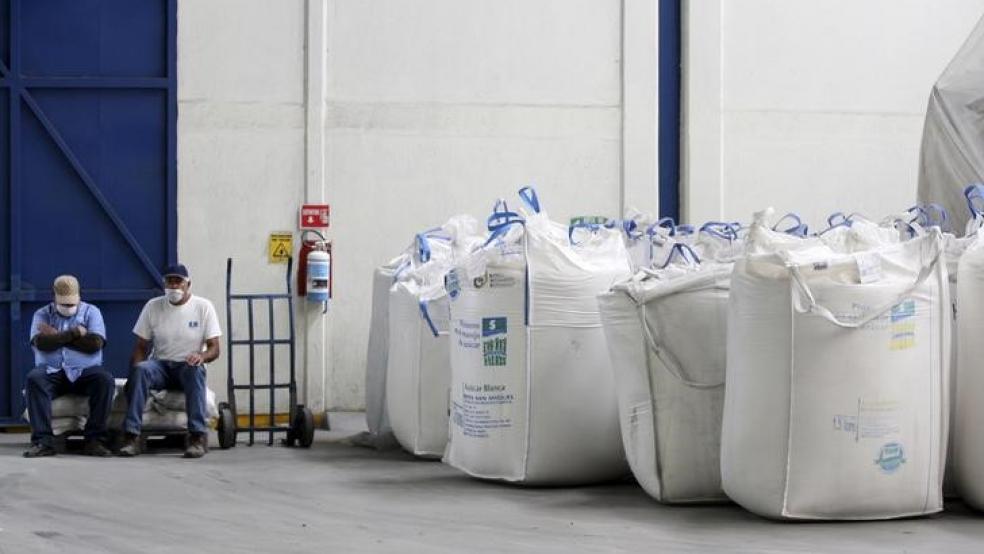Mexico on Tuesday conceded to U.S. demands for changes in the terms of Mexican access to the lucrative U.S. sugar market, striking a deal with Washington that will likely lift prices of the sweetener to U.S. food processors and consumers.
Sugar producers in the United States refused to endorse the agreement in principle between the two governments after pushing for even more concessions from Mexico, raising the possibility that the deal could collapse.
Related: Trump Makes a Lot of Noise on NAFTA: Is This the Art of the Deal?
The agreement in principle between U.S. Commerce Secretary Wilbur Ross and Mexican Economy Minister Ildefonso Guajardo aims to resolve a long-standing trade dispute between the two countries.
Without it, the United States could have reimposed steep import duties on its southern neigbour and risked the prospect of a retaliation from Mexico just as the two countries and Canada prepare to renegotiate the North American Free Trade Agreement this year.
Under the deal, Mexico would sharply reduce the share of refined sugar it exports to the United States and increase raw sugar exports.
"We have gotten the Mexican side to agree to nearly every request made by U.S. industry to address flaws in the current system and ensure fair treatment of American sugar growers and refiners," Ross told a news conference.
Still, Ross said the U.S. sugar producers had told him that they could not accept the deal in its current form, but he hoped that they would agree to some changes in a final drafting of the agreement in the next several days.
He did not elaborate on what action the Commerce Department would take if there were no final agreement with the U.S. producers. It was unclear if Ross would impose the settlement if U.S. producers did not sign onto it.
Related: Here’s What the US Imports From Mexico – and Who Would Pay Trump’s 20% Tax
The agreement lifts the minimum prices for Mexican imports, which will likely be passed on by U.S. sugar refiners to food companies and beverage and confectionary producers and ultimately to consumers.
A trade group that represents a coalition of U.S. sugar buyers and other firms that are critics of the U.S. program said the deal favored the interests of U.S. sugar producers, and estimated the cost to the consumers in higher prices for food, drinks and confectionary at around $1 billion.
"Today's announcement is a bad deal for hardworking Americans, and exemplifies the worst form of crony capitalism," the U.S. Coalition for Sugar Reform said in a statement.
The negotiations were an attempt to settle an anti-dumping and anti-subsidy case brought by a coalition of cane and beet farming groups and ASR Group, the maker of Domino Sugar that is owned by the politically well-connected Fanjul family of Florida.
While the limits on refined sugar from Mexico at 30 percent were significantly below the previous 53 percent limit, these groups had initially pushed for a 15 percent limit.
Sources on both sides of the border had said on Monday that the U.S. sugar industry had added new demands outside of the terms agreed on earlier yesterday by the two governments.
The American Sugar Alliance said it objected to the new deal because Mexico would still be able to ship in refined sugar to meet additional U.S. demand above quota. The alliance wants the U.S. Department of Agriculture to have the final say on the type of sugar to be imported.
Related: U.S.-Mexico sugar deal struck ahead of NAFTA talks; industry divided
LONG-STANDING FEUD, NAFTA LOOMS
The agreement, if finalized, was expected to avert potential retaliation from Mexico on imports of U.S. high-fructose corn syrup which had worried corn growers and refiners.
The potential for an escalation in the dispute would have soured the relations between the two countries ahead of NAFTA renegotiations. Agriculture is typically one of the most sensitive areas in trade negotiations.
Representatives of some of the world's biggest grain traders, Archer Daniels Midland Co and Cargill Inc [CARG.UL] joined Cocal-Cola Co and others to lobby against the U.S. sugar producers in the dispute.
"Avoiding a trade war will benefit everyone, and I'm glad that this years-long trade dispute is finally reaching its end," said Republican Senator Chuck Grassley of Iowa, adding that Ross balanced all interests in the negotiations.
U.S. refiners wanted even more stringent terms on imports from Mexico. They have complained that high-quality Mexican raw sugar was going straight to sugar consumers, rather than passing through U.S. refineries. Mexican producers would have been happy with a rollover of existing terms.
The deal would mark the culmination of a multi-year dispute between the countries over sugar, after U.S. groups in 2014 asked the government for protection from subsidized exports from Mexico. In 2014, the U.S. government slapped large duties on Mexican sugar but hammered out a deal with Mexico that suspended those levies. Factions of the U.S. industry have said that the deal failed to eliminate harm to U.S. producers from Mexican imports.
ASR Group and fellow cane refiner Imperial Sugar, owned by commodities firm Louis Dreyfus Company BV [AKIRAU.UL], have said they are being starved of raw supplies under the current deal. They have asked the U.S. government to terminate the pact.
The latest talks began in March, two months after U.S. President Donald Trump took office vowing a tougher line on trade to protect U.S. industry and jobs.




